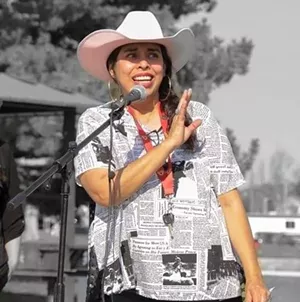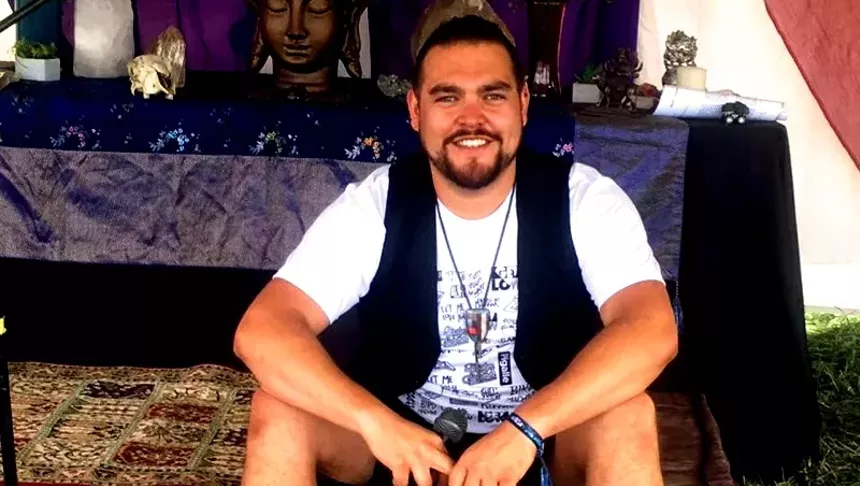The deadline to do so is November 14, and the group just finished a draft of the recommendations for public comment, which will open for thirty days by June 24 at the Colorado Department of Public Health and Environment website. Plenty of discussion is expected on everything from funding to whether state agencies need to be given more rulemaking power, all of which can be incorporated into the final recommendations.

Commerce City activist Lucy Molina wants the task force to put people ahead of technical considerations.
Lucy Molina Facebook
There was certainly plenty of debate during the latest meeting, particularly over the definition of “disproportionately impacted communities.” The draft recommendations currently include two options for a definition of such communities.
“A single, standard definition of disproportionately impacted community should apply to all state agencies,” the first option states. “This definition should include a range of factors, to ensure that agencies more focused on economic regulation also consider public health (i.e., cumulative impacts), and that agencies more focused on public health also consider economic factors (e.g., energy costs).”
Robyn Wille, a task-force member who’s the CDPHE Air Division’s chief strategy officer, pushed for agencies to have more flexibility in their work with disproportionately impacted communities, and endorsed the second option: “The legislature should adopt a single definition that applies to all state agencies that includes multiple criteria that can be applied in different contexts by different agencies. Agencies should then have discretion to identify disproportionately impacted communities on a case-specific basis in the scope of their work to implement the definition.”
But Jamie Valdez, a task force member from Pueblo appointed to represent the interests of people of color, argued that regardless of what an agency does, a community that’s disproportionately impacted is still disproportionately impacted, so the first option makes more sense. “I don’t understand why there is this question of who should decide,” he said. “We have the numbers for that.”
The draft recommendations currently suggest identifying disproportionately impacted communities as those where 40 percent of the population consists of people of color and 40 percent of the population is defined as low-income or cost-burdened (spend more than 30 percent of income on housing), according to the latest United States American Community Survey. The draft recommendations also include a stipulation that other communities may be identified as disproportionately impacted if the community has a history of environmental racism or experiences socioeconomic stressors, suffers disproportionate environmental burdens or is vulnerable to environmental degradation. Wille worries that this second stipulation could mean agencies are forced to consider communities and factors outside of their scope of work.
Ean Thomas Tafoya, co-chair of the task force and a Denver mayoral candidate, emphasized that the need for ongoing funding should be part of the recommendations if the group wants to see them implemented. “We should continuously, throughout this document, be saying, ‘Legislature: If you want to get this done, you’ll have to fund it, and that will have to be a priority,’” Tafoya said. Co-chair Tyson Johnston agreed, saying a ballot measure to get funding could be a possible recommendation.
Another recommendation that’s still being debated would clarify how all the agencies that impact environmental justice across the state work together. At one point, Johnston joked that the task force should recommend that the state form an Office of Interagency Collaboration because of how much collaboration addressing environmental justice will take. He wasn’t entirely joking, though, and Tafoya reminded the group that community advocates had pushed for an Office of Environmental Justice to handle such coordination, but the political will for a project like that didn’t exist.
“Can this be the committee that will unite the departments?” Lucy Molina, a longtime Commerce City resident and activist, asked during the meeting’s public-comment period, echoing the task force’s concerns about who would ensure that its recommendations are followed. And she urged the group to make sure the recommendations focus on the human element. “I should be happy,” she said. “I should be enjoying my teenagers instead of going to the hospital expecting cancer.”
Valdez agreed that it’s critical to remember the individuals in these communities.
“All of the comments that we’ve heard today really point to the frustration that people are feeling with the conversations that we’re having here,” he said. “Our conversations tend to be focused on…which agency is going to be able to implement changes, or the difficulty or ease with which business is going to continue to be able to make profits. Meanwhile, [the fact] that people, real people, are suffering as a human cost is what gets left out of the equation over and over and over again.”
Stay connected with us on social media platform for instant update click here to join our Twitter, & Facebook
We are now on Telegram. Click here to join our channel (@TechiUpdate) and stay updated with the latest Technology headlines.
For all the latest For Top Stories News Click Here

